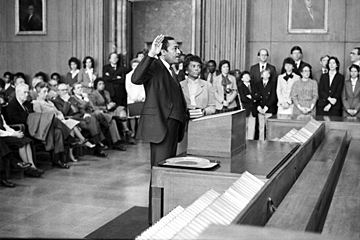State Senate Leader Phil Berger, R-Rockingham, wants to remove North Carolina’s Jim Crow-era literacy test for voters. It “ought to be out of our constitution,” Berger said.
In 1900, during Jim Crow, the literacy test requirement was added to the state Constitution.
Article VI, Section 4 of the North Carolina Constitution states: “Every person presenting himself for registration shall be able to read and write any section of the Constitution in the English language.”
As it stands, the literacy test provision in the North Carolina constitution is not enforceable and violates the federal Voting Rights Act of 1965.
North Carolina lawmakers attempted to remove the provision by putting it on the ballot in 1970, but voters rejected it.
The process for removal requires three-fifths of state legislators to put it on the ballot for the next election. Voters then decide whether they would like to keep the provision or remove it.
“It was a Jim Crow law to keep certain people from voting, and now we need to repeal that to be appropriate,” said Speaker Pro-tem Sarah Stevens, R-Surry.
Stevens has been working on getting this language out of our Constitution for years but says there has been hesitancy by some to try again today. “Why put it out there to embarrass ourselves again and risk having it fail just because people don’t understand it,” Stevens said some of her counterparts argue.

North Carolina’s first black chief justice on the N.C. Supreme Court, Henry Frye, remembers being on the receiving end of a literacy test in 1956, when he went to register to vote with his fiancee.
“The person who was the registrar started asking me questions, like name the 14th something about the 14th amendment,” Frye told Spectrum News. “Name certain signers of the Declaration of Independence. And I said ‘why in the world are you asking me all these questions?’ And he said they are right here in the book. I said ‘well, I think all that I need is to be able to read and write according to section two of the Constitution in order to register.’ He said these are right here in the book, and he reached under the desk and pulled out the book and showed me the book where those questions were in there.”
Frye and his fiancee were denied registration, and the experience inspired Frye to become a lawyer. He graduated from law school at the University of North Carolina Chapel Hill as the only black man in his class.
Berger is interested in trying again to eliminate it this year. “It’s something that I’ve talked to people about. I think it’s something that ought to be out of our Constitution,” Berger told reporters on Tuesday. “But remember, we tried one time in the past to have it out, and we put it to the people, and people refused to take it out of the Constitution. Now, that’s been 50 years,” he said, referencing the attempt from 1970.
“If lawmakers are worried about politicians and political activists using an upcoming vote on the literacy test as a partisan bludgeon in a general election year, I propose putting it on the ballot during the primary election instead,” said Andy Jackson, director of the Civitas Center for Public Integrity at the John Locke Foundation. “It helps remove the politics from the discussion and will hopefully squash concerns about it being confusing for voters.”
There has not been a bill filed yet to remove the provision from the state’s Constitution.